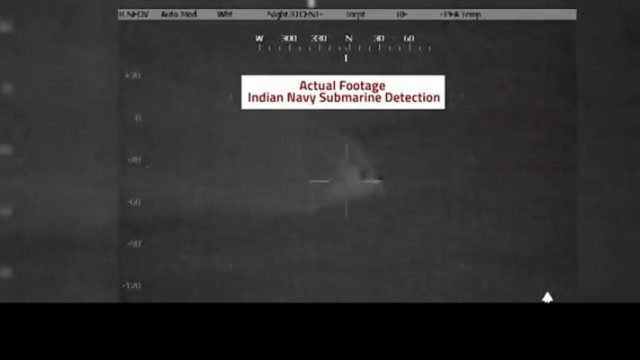Navy foils Indian sub’s bid to enter country’s waters
‘Latest Kalvari-class vessel’ tracked, intercepted by anti-submarine warfare units on March 1

The Pakistan Navy tracked an Indian submarine and foiled its attempt to enter the waters of the country on March 1 (Tuesday), the Inter-Services Public Relations (ISPR) said on Thursday.
According the military’s media wing, the Indian submarine, the “latest Kalvari-class vessel”, was tracked and intercepted by anti-submarine warfare units of the Pakistan Navy.
ISPR Director General Maj Gen Babar Iftikhar wrote in tweet that this was the fourth detection of an Indian submarine during the last five years and was a "reflection of Pakistan Navy’s competence and resolve to defend maritime frontiers of Pakistan", as he shared the footage of the submarine.
#PakistanNavy Anti-Submarine Warfare Unit intercepted & tracked latest Kalvari class Indian submarine on March, 1.
— DG ISPR (@OfficialDGISPR) March 3, 2022
The recent incident being the fourth detection in last 5 years is reflection of Pakistan Navy’s competence & resolve to defend maritime frontiers of Pakistan. pic.twitter.com/6sn1WvpUVj
Later in a detailed statement, the ISPR DG said the Indian Navy had deployed its submarine against Pakistan with ulterior motives. “However, yet again through continuous vigilance and professionalism, Pakistan Navy has foiled [the] Indian submarine’s attempt of entering into Pakistani waters.”
He added that the possibility of Indian infiltration attempts by sub-surface units was anticipated due to the prevailing security situation and the ongoing Pakistan Navy war games -- Seaspark-22.
Hence, the navy maintained strict monitoring and "stringent vigilance" procedures were enforced. As a result of the measures taken, the ISPR chief said the Pakistan Navy anti-submarine warfare units had taken the lead and prematurely intercepted and tracked the Indian submarine Kalvari on March 1.
The Indian vessel, a diesel-electric attack submarine, was reportedly on a reconnaissance and an intelligence-gathering mission and was most likely spotted by maritime surveillance assets when it came to snorkelling depth to recharge its batteries.
In the recent past, Indian submarines have repeatedly attempted to enter Pakistani waters.
In October 2019, an Indian submarine was detected and pushed out of Pakistani territorial waters by the navy.
An Indian submarine was detected near Pakistani waters in March 2019 -- a month after the Pulwama bombing that heightened tensions between New Delhi and Islamabad. That attempt too was foiled.
In November 2016, the navy had detected an Indian submarine in the south of Pakistan's coast.
"The unsuspecting submarine was detected and localised south of Pakistani coast on November 16. Thereafter, despite the submarine’s desperate efforts to escape detection, it was continuously tracked by Pakistan Navy Fleet units and pushed well clear of our waters," the ISPR had said at the time.
The bulk of the Indian Navy’s undersea fleet is composed of diesel-electric Kilo-class submarines, known as the Sindhughosh class, and the Scorpene class or the Kalvari class.
The Indian Navy also operates a nuclear-powered ballistic missile submarine (SSBN), the INS Arihant, which was manufactured locally after decades of delay.
The UN Convention on Law of Sea does not in “any way authorise the carrying out in the exclusive economic zone and in the continental shelf of any coastal State military exercises or manoeuvres by other states, in particular where the use of weapons or explosives are involved, without the consent of the coastal State concerned”.



















COMMENTS
Comments are moderated and generally will be posted if they are on-topic and not abusive.
For more information, please see our Comments FAQ